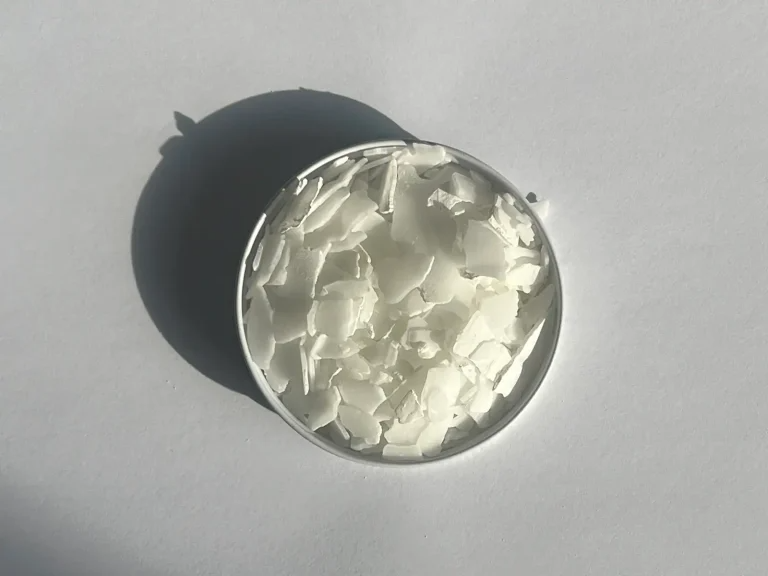Calcium Chloride
Calcium chloride
Calcium chloride is a type of inorganic compound that is odorless, in other words, a calcium salt that is highly soluble in water.
The chemical formula of calcium chloride is CaCl2, which is formed by neutralizing hydrochloric acid with calcium hydroxide. This inorganic compound is considered a primary industrial raw material and is present in solid form at room temperature.
It has a molar mass of 110.98 gr/mol and a density of 2.15 gr/cm3. The melting point of this compound is 772 . Calcium chloride is commonly found as a hydrated solid with the formula CaCl2(H2O)x. There are different values for x, such as 6, 4, 2, 1, or 0. These compounds are mostly used for dust control and ice removal on roads because anhydrous calcium chloride salt has the property of absorbing moisture, making it suitable as a desiccant.
Calcium chloride is one of the most important and versatile mineral chemicals used in industries such as drilling (as a drilling mud chemical), food, and pharmaceuticals.
For more information on calcium chloride prices and ordering methods, you can contact the experts at Petro Nour Mehr Company. The export of calcium chloride, worldwide is our expertise.

Calcium Chloride Manufacturers in Iran
Some popular factories are producers of this material in Iran.
Calcium Chloride Manufacturers Worldwide
Throughout the world, there are numerous producers of calcium chloride actively engaged in this industry. Some of the well-known calcium chloride manufacturers globally include:
- Occidental Chemical Corporation: This company is one of the largest producers of chemical products and manufactures products including calcium chloride.
- TETRA Technologies, Inc: This company is a leading player in the drilling industry and the production of associated chemical materials, including calcium chloride.
- Ward Chemical: This company is also a reputable manufacturer of calcium chloride in the Americas and distributes its products to various markets.
These manufacturers are just a few examples of the many companies worldwide involved in the production of calcium chloride.
Applications of Calcium Chloride
Calcium chloride is used in many industries and applications. Due to its favorable physical and chemical properties, this substance can be used in the following cases:
- Roads and Highways: This material, like sodium chloride, is used to create mass and increase friction on roads by reducing the freezing point of ice. When calcium chloride dissolves, an exothermic reaction occurs, generating heat.

- Moisture Control: It acts as an active moisture absorbent and can absorb moisture to the extent that it turns into liquid brine. This property makes it useful as a moisture-absorbing agent for controlling moisture in various environments.
- Food Industries: This material is commonly used as a food additive in the food industry. This compound is added to food products such as cheese, tofu, canned fruits, and vegetables to firm and solidify their texture.

- Construction: In construction projects, adding calcium chloride to concrete can accelerate the curing of materials at lower temperatures. This additive can increase the curing rate to some extent at temperatures lower than that of regular concrete.

- Drilling: This material is widely used in oil well drilling as it can regulate the density of drilling fluids and assist in controlling pressure. Additionally, it can act as a solid dust absorber in drilling environments and facilitate mud disposal.

In conclusion, the use of this material in various industries including drilling, food industries, and construction is very common and has diverse effects on these industries. However, caution is needed in its use, and sufficient knowledge about its properties and proper usage is essential to prevent health and environmental issues.
Storage Conditions for Calcium Chloride
There are some guidelines for better preservation of its quality:
- It is ideal to keep these materials dry and cool; a temperature of less than 25 degrees Celsius is preferable for storage.
- Keep this material out of direct sunlight and ultraviolet light, since these sources of light may alter its chemical and physical characteristics.
- These substances react with acids and solvents, among other compounds. It is therefore recommended to stay away from direct contact with these kinds of compounds.
- During storage and transportation, ensure that this material is protected from scratches and impacts, as physical damages can lead to changes in its structure and chemical properties.
- Packaging for this grade should be made of suitable material to protect it from environmental changes and reduce the penetration of water and air into the packaging.
- Certain items can need particular storage conditions. Consult the manufacturer’s directions in this situation.
Packaging for Calcium Chloride
For packaging and exporting this material, various methods can be employed depending on environmental conditions, product requirements, and transportation facilitation for export. The following are some typical ways that Calcium chloride powders are packaged and exported:
- Packaging in Jambo Bags: This method is common for packaging Calcium chloride powders, where the powders are packed into large bags with varying capacities (usually between 500 to 2000 kilograms). These bags are appropriate for air, sea, and road transportation in addition to protecting the product from contamination and moisture.
- Packaging in Small Bags: In this method, Calcium chloride powders are packed into smaller bags with capacities of approximately 20 to 25 kilograms.
- Use of Pallets: Calcium chloride powders large pallets.
Choosing the right packaging and exporting strategy for this material powder or flakes can be accomplished with success if international packaging standards, labeling, and transportation requirements are followed. It’s crucial to think about protecting the product from environmental deterioration, shocks, and humidity while it’s being transported.
Advantages and Disadvantages of Calcium chloride
Calcium chloride is a chemical compound with specific advantages and disadvantages. One of the major advantages of using this compound is its ability to absorb and retain moisture. This property makes it a potent desiccant, utilized in various industries such as food processing, drilling, and water purification. Additionally, calcium chloride also possesses anti-freezing properties, which can be effective in sewage treatment, dust control, and dust suppression.
On the other hand, one of the main disadvantages of using calcium chloride is its adverse effects on the environment. During use and disposal, this substance may lead to an increase in salt levels in groundwater or surface water and an increase in calcium ion content in the soil, which can negatively impact the growth of plants and terrestrial animals. Moreover, this compound can be irritating and abrasive, especially in cases of direct contact with the skin or inhalation.
Therefore, careful measures should be taken when using calcium chloride to mitigate its negative effects on the environment and human health.
Physical and chemical properties of Calcium chloride:
Calcium chloride possesses numerous physical and chemical properties, some of which are discussed below:
- The chemical formula of calcium chloride is CaCl2.
- This material exists as a solid in white or transparent form and may appear as a powder or crystalline.
- At normal temperatures, calcium chloride is in solid form, and at higher temperatures, it becomes liquid.
- The melting point of calcium chloride is approximately 772 ℃ .
- It has high solubility in water, and its solubility increases with temperature.
- This compound quickly dissolves in water, and the resulting solution has specific physical and chemical properties.
- This material readily absorbs atmospheric moisture, and the resulting solution exhibits relative resistance to evaporation.
- This compound is capable of participating in various chemical reactions, such as reacting with sodium carbonate (to produce carbon dioxide and sodium chloride) or reacting with acids.
Types of Calcium chloride grades:
This material is available in the market in various grades, primarily classified based on purity and different applications. Some of the types of calcium chloride grades include:
- Calcium chloride Food Grade: This material, a type of chemical compound, is used as a safe and suitable material for consumption in the food industry. This grade is often characterized by high purity and is produced in accordance with specific health and safety standards to ensure the quality and safety of food products.
Among the applications of food-grade calcium chloride are uses such as: being utilized in the production of animal feed and poultry as a source of nitrogen and calcium, improving and enhancing color and shelf life properties in various food products, controlling pH in the production processes of food items, used in the fruit juice and beverage industries to prevent freezing, and also employed in the production of protein products such as eggs and dairy. However, it is important that these products be prepared and used in accordance with health guidelines and standards to ensure the safety and quality of food.
- Pharmaceutical Grade Calcium chloride: Pharmaceutical grade this material is a form of chemical substance that is produced in compliance with pharmaceutical standards and regulations for use in the pharmaceutical industry and medical products. This grade is often characterized by high purity and may undergo special purification and refining processes to ensure its high quality and safety.
This material in this grade is typically used as a source of nitrogen and calcium in the preparation of drugs, vitamins, dietary supplements, healing materials, and other pharmaceutical products. The use of this grade in pharmaceutical products may be based on relevant pharmaceutical guidelines and standards, and the primary goal of using this grade is to ensure the high safety and quality of pharmaceutical products for human consumption.
- Industrial Grade Calcium chloride: Industrial grade this material is a type of chemical substance that is used as an industrial and general-purpose material. This grade usually has lower purity compared to food or pharmaceutical grades and is mostly used for industrial and manufacturing purposes.
The applications of industrial grade calcium chloride include: its use in the oil and gas industries for pipeline flushing and hydrate control, in drilling industries as drilling mud, in protein and dairy industries as a stabilizing agent, in water and wastewater treatment for discharge and purification of polluted waters, in metal industries for moisture removal, and also in automotive industries for controlling ice formation and anti-skid brakes. In general, industrial grade calcium chloride serves as a versatile and multi-purpose material in various industries.
- Technical Grade Calcium chloride: Technical grade calcium chloride is typically used for technical and non-industrial purposes. This type of grade has the lowest purity compared to other grades and is mostly utilized as a general chemical substance for use in water treatment processes, production of smaller chemical products, laboratory and research processes, wastewater treatment, and similar applications.
This grade may serve as a raw material for the production of other calcium chloride grades. Since its purity is lower, its price is usually lower than other grades and it is suitable for applications that do not require high purity.
Comparison of different grades of Calcium chloride:
Different grades of this material have varying purities and different applications. Ordinary or technical grades of calcium chloride, often known as technical or industrial grade, have lower purity and are mostly used for technical and non-industrial purposes such as water treatment, laboratory and research processes, and wastewater treatment.
Food grade calcium chloride, with higher purity and compliance with human consumption standards, is produced. This grade is usually used in food industries, drinking water treatment, and other applications related to human consumption.
Pharmaceutical grade calcium chloride has a much higher purity and is used in pharmaceutical industries and the production of pharmaceutical products. This grade must meet strict standards for use in pharmaceutical products and must comply with the requirements of pharmaceutical and health products.
Overall, each grade of this material can have its own advantages and disadvantages, and depending on the desired needs and applications, it can be chosen accordingly.
How to Buy Polyethylene?
- Buy from a reputable and authorized supplier that holds necessary certifications and guarantees quality.
- Compare the prices of these materials in different markets and compare them with the global market price.
- Examine the sales conditions regarding quantity, delivery time, packaging, transportation methods, and payment terms.
- If you intend to import polystyrene from foreign countries, investigate customs and legal regulations and comply with export and import regulations.
- Contact bravopolymer to obtain the most suitable export price based on your conditions.
- After signing the contract, you can place your order.
- Secure and suitable payment methods according to customer preferences are provided by the company.
- Then, the loading stage is completed by selecting and introducing a transport company.
- Necessary documents for customs clearance at the destination city are also provided to customers by bravopolymer.
The largest distributor of polymers in the Middle East


















